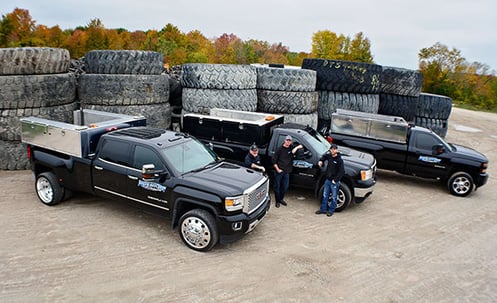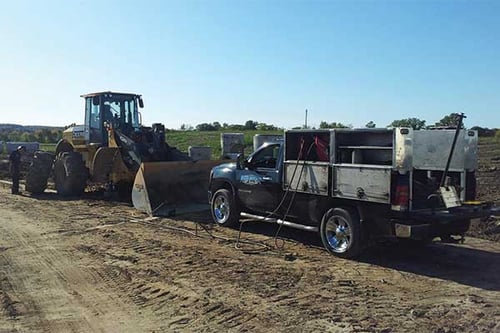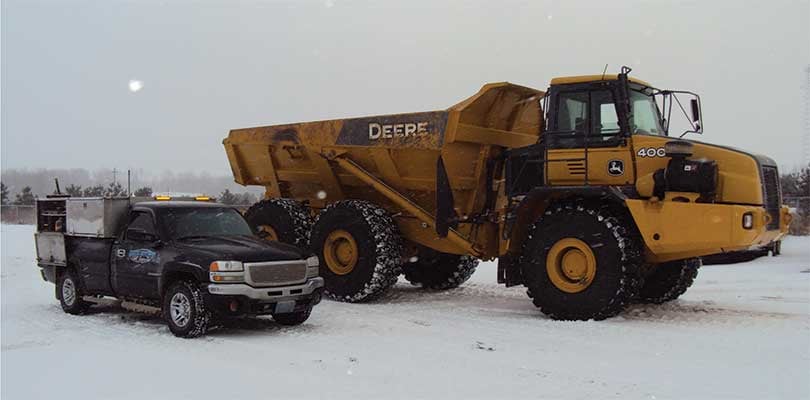How A Family Tire Service Business Earned Its A+ Reputation For 3 Generations
Originally published in Heavy Equipment Guide, January 2019 edition.
There’s a reason almost everyone in Orillia, Ontario has heard of Keith Kitchen Full Service Tire. It’s a family business built up by three generations, with a reputation for excellent service that has held strong for over 35 years.
“My dad started in the tire business in 1958 and founded his own tire service business in 1970. I carried it through, and now two of my sons are carrying it through as well,” said owner Keith Kitchen. “When people hear the name ‘Kitchen’, they think of our business.”

Keith runs the business with the help of his two sons, Tyler, 32, and Justin, 31. The Kitchen trio are known within their community as the go to guys for any mobile tire needs; from skid steer tires and tractor tires to off-road mining truck tires and Caterpillar’s 980 loader tires, the team at Keith Kitchen Full Service Tire can service it all.
But it takes more than a good family name to earn the outstanding reputation that Keith Kitchen Full Service Tire has. In this case, it takes a commitment to high quality service, supported by high quality tools and equipment.
“I don’t buy any cheap tools because we just wear them out. I only buy the best pneumatic tools, and they make my job easier,” explained Keith.
It’s that line of thinking that led Keith to equip his fleet of three service trucks with UNDERHOOD® 70 CFM air compressors.
“These air compressors are so efficient. I buy 1-inch Snap-on impact wrenches. When we check the torque, 99% of the time it is within torque specs. With the UNDERHOOD® running at a consistent pressure, I’m within 5 pounds every time. Last year we serviced 5,000 truck tires—that’s 20,000 wheel nuts. I wear my impact wrenches out every year and I already have 145 hours on a 2-month old truck, yet all my VMAC air compressors are still working.”

Keith witnessed first-hand how long UNDERHOOD air compressors can last. He previously had another truck equipped with an UNDERHOOD air compressor, which he sold to a Nottawa-based mobile tire business called McKee Tire back in 2010. That business was later acquired by Tirecraft and, to this day, Keith’s former truck and air compressor are still being used by McKee Tirecraft.
“I guess I shouldn’t have sold it,” said Keith with a laugh.
Fortunately, Keith isn’t going to let history repeat itself. He’s in the process of building a fourth truck to replace the oldest in his fleet. The retiring truck will be used as a spare, as everything is in decent working order even after logging 6,700 service hours on the air compressor.
Before using the UNDERHOOD, Keith had a Champion reciprocating gas-drive air compressor that didn’t last long.
“I started with a gas air compressor, but it wore out in 18 months,” said Keith.
An upgrade to a rotary screw compressor fixed that problem, and solved a new one:
“Inflating a truck tire with a traditional reciprocating compressor takes six-and-a-half minutes to inflate to 120 psi. It takes two-and-a-half minutes with my VMAC air compressor. I save four minutes on every tire.”
Those four minutes add up quickly, especially when multiplied by 5,000 tires per year. It’s the equivalent of 333 hours or 13.8 full days every year, which is time that Keith and his sons can now invest into their business and families. The extra time is also beneficial to Keith’s clients, who have come to rely on his fast service.

At the end of the day, Keith knows that his business and his clients deserve the best. By choosing the highest quality air compressors, pneumatic tools, and service trucks, Keith has managed to create a loyal following of customers that keep him busy 10 to 12 hours a day. In 2017 alone, Keith Kitchen’s Full Service Tire generated over $1 Million in revenue.
“I would recommend the UNDERHOOD to anybody in the tire business who is serious. I know some people don’t bother to invest in a good quality air compressor because of the initial expense but when you add up what it actually costs you each year, it’s pennies.”
